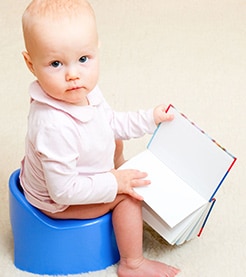Ensuring your baby gets sufficient nutritional intake for growth and general well-being is important. As your baby develops, he or she will be exposed to a wide variety of foods, and experience many dietary changes. If your baby has difficulty eating, and digesting, and experiences abnormal bowel movements, these may be a temporary response to changes, or they could signify more serious problems.
Here are some common dietary conditions your baby may encounter:
What Are The Symptoms Of Constipation In Babies?

- Straining when passing out stools
- Less frequent bowel movement than usual
- Passing out hard, dry stools, or stools that are small and pellet-like
Some causes of constipation in babies include:
Dietary transitions
Your baby may experience constipation when switching from breast milk to formula milk or from formula milk to solid foods. This may be a response to dietary changes.
Dehydration
Your baby may become constipated if he or she is not getting enough fluids, or if you are feeding your baby a low fibre diet. This may lead to dry and hard stools that are difficult to pass.
Babies with chronic constipation are at risk of developing anal fissures or haemorrrhoids due to excessive straining when passing hard stools. It may also be a symptom of other conditions.
When should I see a paediatrician if my baby has constipation?
You should see your paediatrician if you notice blood or mucus in your baby’s stools, or if your baby’s constipation becomes chronic. Your paediatrician will work with you to identify the causes of your baby’s constipation, and come up with a treatment plan to manage the condition.
What Causes Diarrhoea?
Diarrhoea is usually caused by a viral or bacterial infection, food poisoning, lactose intolerance or a side effect of certain medications. Depending on the cause, the duration of diarrhoea may vary between two and four days. Occasionally, it may last up to 10 days. It may also be accompanied by vomiting.
As diarrhoea can lead to dehydration, which can be serious in babies and young children, it is important to replace the fluid lost through bowel movement.
Signs of dehydration include:
- Not passing urine for prolonged periods
- Weight loss
- Tiredness
- Dry tongue, eyes and lips
- An increased heart rate
If your baby has diarrhoea, ensure that you feed him or her with fluid frequently throughout the day, preferably in the form of oral rehydration solutions.
When should I bring my baby to a paediatrician if my baby has diarrhoea?
While diarrhoea can be resolved on its own without medication in some babies and children, you should bring your baby to your paediatrician if:
- Your baby’s diarrhoea is excessive, passes large amounts of stool more than three times in a day
- Your baby’s diarrhoea is prolonged, lasting more than four to five days
- Your baby’s diarrhoea is accompanied by persistent vomiting
- Your baby refuses to eat or drink
- Your baby’s stools are black, bloody or look like rice water
What Causes Stomach Flu?
Stomach flu, or gastroenteritis, is an inflammation of the digestive tract lining. This illness is usually caused by viruses such as the rotavirus, norovirus, adenovirus, or enterovirus. It can also result from bacterial infections, including Salmonella or E. coli. As babies and children have weaker immune systems, they will be more prone to this condition.
If your baby or child has caught the stomach flu, he or she may experience unpleasant symptoms such as fever, chills, diarrhoea or vomiting. While most stomach flu cases are not serious and will resolve on its own, it may sometimes cause dehydration or other complications in your baby or child.
When should I bring my child to a paediatrician if my child has stomach flu?
You should see a paediatrician if your child is / has:
- Lethargic
- Taking less than half share of fluids and food
- Vomits persistently
- Passing less amounts of urine than usual, or none in between six to eight hours
- Significant weight loss of more than 5 per cent
- Blood or mucus in the stools
- Severe abdominal pain
Your paediatrician may prescribe medications to ease your child’s symptoms, as well as prescribe rehydration solutions to prevent dehydration.
Picky Eating

Some indicators of picky eating include:
- Having only a narrow range of foods and refusing all others
- Refusing to eat whole food groups
- Throwing tantrums at mealtimes
- Gagging when eating
- Adverse reaction (eg nausea) to the sight or smell of certain foods or food textures
Picky eating can persist beyond childhood. If you suspect that your child is a picky eater, see a paediatrician to address the issue and avoid compromising his or her nutritional intake and growth development.
Make An Appointment
Make an appointment to consult a paediatrician at a children's clinic near you. Select "Specialist Appointment". Under Specialist Appointment Details, select "paediatric medicine" or "paediatric surgery".
Make an enquiry. We will get back to you within 2 working days. You can reach us at 6311 1588.